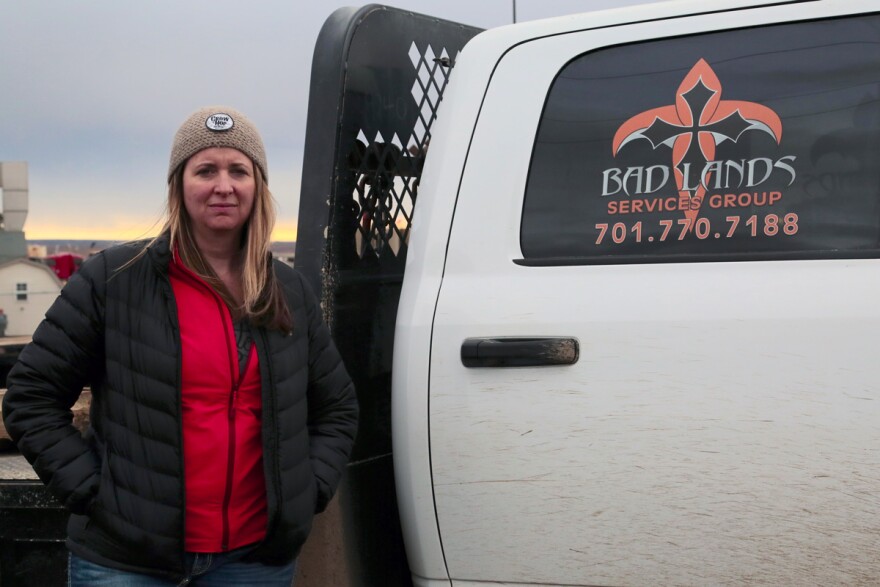In the past few years, workers from all over America flocked to jobs in the booming oil industry. Then the most recent price crash arrived. Since summer 2014, oil prices have dropped by half. Many oil workers nationwide have lost their jobs and more have seen their hours cut.
Apryl Boyce is one of those workers. She's 42, tall, tough-looking and pretty, with long blond hair tucked beneath a beanie. She came to North Dakota's Bakken to drive as a "hot shot" – a driver who hauls equipment from one drill site to another.
Recently, things have slowed down a lot and she's rethinking her part in the Bakken oil boom.
"It used to be you'd get called out at 4:00 in the morning and be doing runs until 10 at night," Boyce she said.
Rig counts have fallen in North Dakota and in other oil booms states like Texas, Wyoming and Colorado. That means less to haul around.
At Badlands Service Group, the small oil field company Apryl Boyce drove for, owner Jim Levasseur said his workforce is 40 percent smaller than it was just a few weeks ago. He's been cutting people's hours and then a lot of them quit.
"They're wanting 60 to 80 hours a week and if they're only going to get 40 hours a week they're going to go home," he said. "It may not be as much money, but at least they're home every night and not sacrificing."
"I lost myself in the oilfields. I lost myself chasing money for all the wrong reasons, and I'm not going to let it happen again."
Levasseur said he doesn't blame them for leaving.
"People get killed up here on a weekly basis," he said. "These are the worst conditions I've ever seen for working."
Safety is only part of why Boyce is leaving. Her unpleasant housing situation is another major contributor.
Levasseur combined employee housing to cut costs. He asked her to move in with 11 young men in a tired old ranch house in Williston.
"I try to wear bulky pajamas and heavy sweatshirts and try to be as unattractive as possible," Boyce said. "Because I don't want to provoke any unwanted comments."
She has searched for other places to live, but an average one bedroom here still runs over $2,000. Her ad on Craigslist seeking housing didn't work either. She received a bunch of offers of free rent in exchange for sexual favors.
"There weren't any legit, comfortable offers," Boyce said.
There's another reason — a deeper reason — why Apryl Boyce has decided to leave the Bakken. Ten years ago, her mother died. At that time Boyce sold everything she owned (except a storage unit full of her mother's cookbooks) and began bouncing from job-to-job: an oilfield trucker in Colorado, a cattle ranch cook in Wyoming. She was running, she said, from anything she used to do, anything that made her feel like herself, until she got to the Bakken.
"It took the absolute grungiest, dingiest, darkest part of life to make me realize you can stop running," she said.
The oilfield slowdown has given her a chance to pause. To think about what brought her the Bakken, and what no longer keeps her there.
"I lost myself in the oilfields," Boyce said. "I lost myself chasing money for all the wrong reasons, and I'm not going to let it happen again."
Apryl Boyce left Williston, North Dakota for a mountain town in Colorado she had talked about a lot. She's running again, but this time to a place that feels like home.
Inside Energy is a public media collaboration, based in Colorado, Wyoming and North Dakota, focusing on the energy industry and its impacts.





